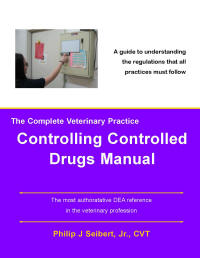Practicing Self-Preservation as the Controlled Drug Coordinator
I am the controlled drug coordinator for my hospital. How do I protect myself from getting blamed for problems that I can't control?
Controlled drug regulations contain some very specific security, ordering, recordkeeping, and oversight requirements. Although a DEA registration is limited to licensed professionals, in a veterinary setting, it’s rarely the registered veterinarian who manages the controlled drug program. That usually falls to a trusted technician or sometimes an office manager or inventory control person. In most cases, an agent of a registrant acting on specific orders of the registrant is not responsible for mistakes or errors except in cases of gross negligence or intentional misconduct. However, when problems arise, it's easy to point the finger at someone else and of course, there’s always the possibility of a dishonest person intentionally falsifying records to make it appear the fault of a co-worker. For those reasons, we strongly suggest that technicians and managers exercise some “self-preservation” in performing their duties. Although these ideas are not required by any federal or state controlled drug regulation, we offer them as a guide to help folks keep the records straight and protect themselves from blame when none is due
When a registrant assigns oversight or
management duty to an agent, the expectations should be clear and
have specific boundaries.
So, what should the technician or manager do
when BEGINNING the role as the
Managing Agent for the controlled drug program in a
veterinary practice?
Here are some ideas:
-
Insist on a physical count of all controlled drugs on the date the managing agent assumes responsibility. It’s best to have two people involved in the counting and have the counters, the agent and the registrant sign the inventory form. By establishing exactly what was present when the managing agent assumed responsibility, blame for previous shortcomings can be avoided. Make a note on the next open line of the logs annotating the actual counts and marking the point where the managing agent assumes responsibility for oversight.
-
Insist that the combination or keyed lock on all drug boxes be changed upon assignment of responsibility. Although regular lock or combination changes are expected, the reality is that most practices don’t do this simple security procedure often enough. Likewise, insist that there be no “hidden keys” that negate security protocols.
-
Review the list of people who have access to the drug supply and ensure their screening documents are current.
-
Understand the established access and logging protocols to identify potential areas of conflict or opportunities for diversion.
During your Tenure as the Managing Agent:
-
Set up or verify an ordering system that incorporates at least 2 people to verify that quantities of drugs ordered matches the quantity received and the receipt entry on the log accurately reflects the transaction. Do not put yourself in a position where you are the one who orders, receives, and logs the drugs. That makes you the “prime suspect” if something is missing.
-
Keep copies of all memorandums or personally generated notes, inventories performed at the start and end of the agent’s access, and emails or messages between the managing agent and the registrant that discuss problems, notifications, or suggestions. Although the agent is not normally entitled to keep personal copies of all logs, ordering documents or medical records, the agent certainly has a right to keep copies of correspondence they generate in the performance of duties.
-
REGULARLY conduct management control counts of drugs and compare the balances on hand to the log balances to catch problems promptly.
-
When making any adjustments be sure to explain in detail the reasons for the adjustment. If the action is more than adjusting the log balances to account for small operational discrepancies, be sure to notify the registrant of the adjustment and keep a record of that notification.
-
NEVER transcribe information onto logs for other people. If someone makes notes on a white board or daily treatment sheet when using controlled drugs, they should be the ones making the entries on the logs.
-
Do not correct errors on log entries made by other people. Although the managing agent should be checking logs for accuracy and completeness often, when a mistake is noticed, the staff member who made the mistake should be made to correct the mistake.
When it’s time for the
Managing Agent to leave the
practice or they are no longer in charge of the controlled drug
program, here are some steps that should be considered:
-
On the last day of access, conduct a physical count of all controlled drugs present. It’s best to have two people involved in the counting and have the counters, the agent and the registrant sign the inventory form. Make a note on the next open line of the logs marking the point where the managing agent no longer assumes responsibility for oversight.
-
Write a note to the registrant formally relinquishing responsibility, authority and access to the drugs. Ask for written acknowledgement of the resignation of duties, even if that’s just having the registrant sign the bottom of the note or letter. An email may be sufficient, but it’s best to have a signature.
-
Turn in any keys to controlled drug boxes and insist that combinations be changed. It would be wise to get a signed receipt for keys.
Did You Know...?
The Complete Veterinary Practice Controlling Controlled Drugs Manual is the most comprehensive veterinary-specific guide to understanding the DEA rules AND HOW TO COMPLY in the most practical ways.
Click here for ordering information.

